Seminole Wars deck by James Y. Humphreys, Philadelphia, c.1819
Court cards from the Seminole Wars deck by J. Y. Humphreys, Philadelphia, c.1819. Ace of Spades from Jazaniah Ford's Decatur deck, 1815. Jazaniah Ford was born in Milton (Massachusetts) in 1757
Historic Playing Cards
Seminole Wars deck by James Y. Humphreys, Philadelphia, c.1819
The front cover of Life Magazine, May 30, 1955, featured a colour photo of “Historic Playing Cards commemorating early U.S. events and heroes” whilst the accompanying article inside the magazine displayed “the masterpieces of colonial designers who created native styles as statesmen were building a new nation... Long before 1776 the independence of America was being declared by its arts and manufactures.. silverware, guns, furniture, houses & playing cards...” The court cards shown are in fact from the Seminole Wars deck by J. Y. Humphreys, Philadelphia, c.1819, whilst the Ace of Spades is from Jazaniah Ford's Decatur deck, 1815.
After the Americans got rid of a king as a ruler they decided to eliminate royalty from their playing cards. General Washington himself became the king of hearts in the rare historical deck illustrated below. Thomas Jefferson is the king of clubs, John Quincy Adams the king of diamonds and General Andrew jackson (the Commander of the War) is the king of spades. The queens are classical divinities - Minerva the queen of spades, Venus the queen of hearts, Ceres of clubs, Justitia of diamonds. Jacks (or knaves) are Indian chiefs - Gy-ant-wachia the jack of diamonds, an unidentified chief the jack of spades, the Iroquois Joseph Brant the jack of clubs, Red Jacket the jack of hearts.
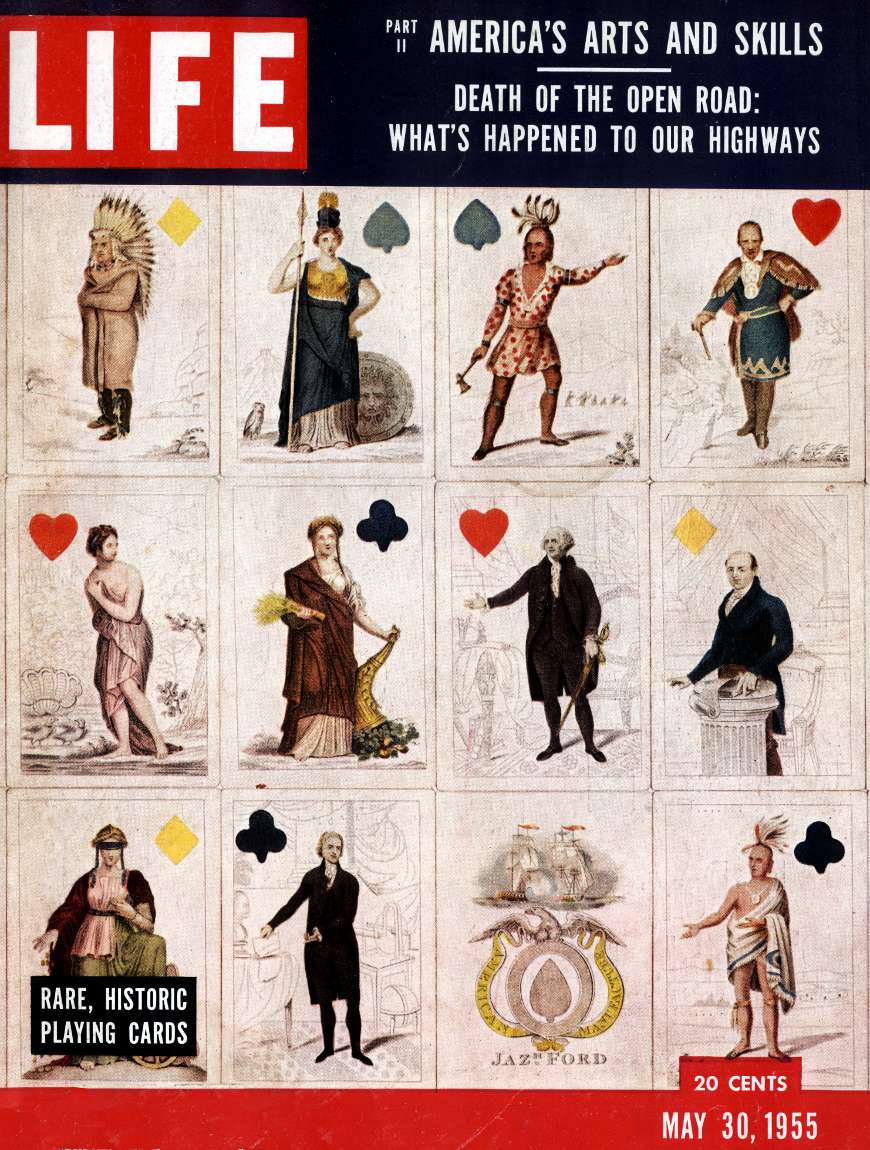
Above: the front cover of Life Magazine, May 30, 1955, featuring “Historic Playing Cards commemorating early U.S. events and heroes.” The court cards are from J. Y. Humphreys' Seminole Wars deck, c.1819, whilst the Ace of Spades is from Jazaniah Ford's Decatur deck, 1815. The cards are hand-coloured with stencilled pips.
The wealthier colonists played “Pope Joan,” quadrille and whist. Few of them kept as full a gambling record as George Washington, whose diaries show that he lost six pounds, three shillings and three pence between 1772 and 1775. After he took control of the Continental army he banned card games among his men, as it was impossible to discriminate between “innocent play” and “criminal gaming.”
By Simon Wintle
Spain • Member since February 01, 1996 • Contact
I am the founder of The World of Playing Cards (est. 1996), a website dedicated to the history, artistry and cultural significance of playing cards and tarot. Over the years I have researched various areas of the subject, acquired and traded collections and contributed as a committee member of the IPCS and graphics editor of The Playing-Card journal. Having lived in Chile, England, Wales, and now Spain, these experiences have shaped my work and passion for playing cards. Amongst my achievements is producing a limited-edition replica of a 17th-century English pack using woodblocks and stencils—a labour of love. Today, the World of Playing Cards is a global collaborative project, with my son Adam serving as the technical driving force behind its development. His innovative efforts have helped shape the site into the thriving hub it is today. You are warmly invited to become a contributor and share your enthusiasm.

Leave a Reply
Your Name
Just nowRelated Articles
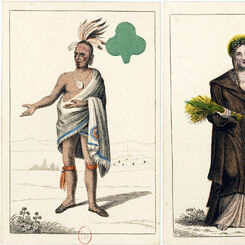
Seminole Wars deck
Seminole Wars deck by J. Y. Humphreys, Philadelphia, c.1819.
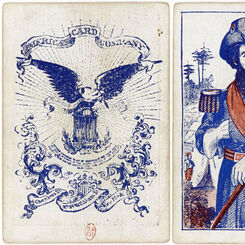
American Civil War playing cards
American Civil War playing cards with suits of stars, US flags, US shields and eagles.
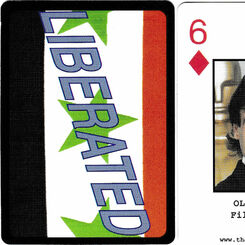
Liberated: America's Most Unwanted
“Liberated: America's Most Unwanted” playing cards published in support of the Iraqi War, c.2003.

War Profiteers playing cards
“War Profiteers” playing cards, USA, c. 2004.
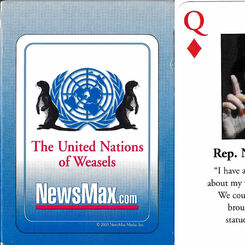
United Nations of Weasels
“United Nations of Weasels” anti-war political playing cards, USA, 2003.

Try’em playing cards
Try’em: the U.S. Regime Change, or “52 Most Wanted Criminals” c. 2003.
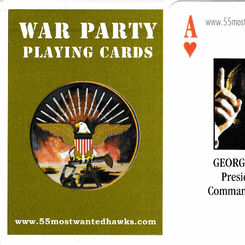
War Party playing cards
War Party playing cards, in opposition to the Iraq War, USA, 2003.
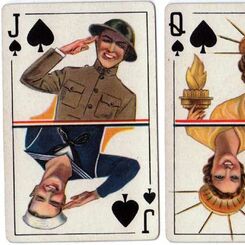
Victory
“Victory" cards celebrating U.S. participation in the Allied victory, c.1945.
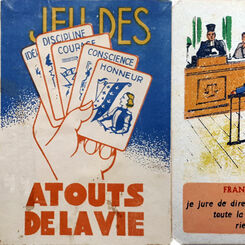
Atouts de la Vie
“Atouts de la Vie” wartime card game created by Madame Lucien Willemetz, c.1940.
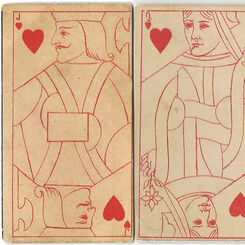
Kinney Transparent Cards
Kinney Bros Transparent playing cards with hidden images and fortunes, c.1890.
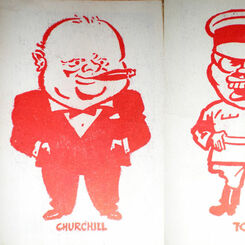
World Leaders Snap
World Leaders Snap published around WW2, c.1940.
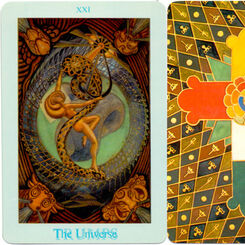
Thoth Tarot – Aleister Crowley Tarot
Aleister Crowley Tarot – the sombre luminary – Crowley and Lady Frieda Harris worked on the illustra...
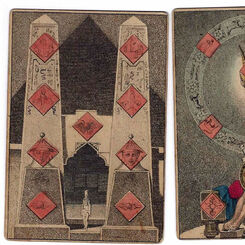
Bartlett Ackermann Transformation
Pictorial playing cards published by C. Bartlett, New York, 1833.
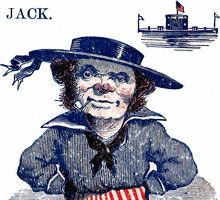
Army & Navy
Andrew Dougherty’s Army & Navy deck from the Civil War era, c.1865.
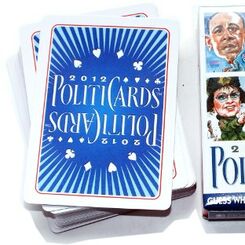
PolitiCards 2012
This 2012 deck of Politicards represents the sixth election year that Peter Green has created these ...
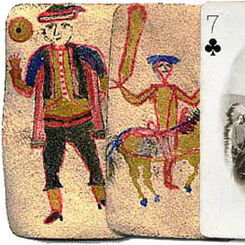
U. S. A.
The manufacture of playing cards in America only began during the second half of the 18th century, a...
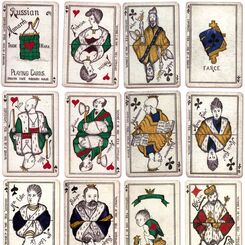
Russian Constitutional Playing Cards, 1909
A rare American Russian political pack depicting events and moods in early 20th century Russia.
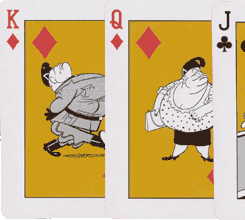
History of the War playing cards
“History of the War” playing cards with caricatures of Winston Churchill, Adolf Hitler, Joseph Stali...

Marlborough’s Victories
Marlborough’s Victories playing cards, first published in 1707, depict Marlborough's campaigns and t...
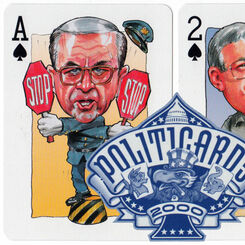
Politicards 2000 by Action Publishing
Politicards 2000 features 54, full colour, caricatures of the candidates, politicians and political ...
Most Popular
Our top articles from the past 60 days


 Your comment here. Your comment here. Your comment here. Your comment here. Your comment here. Your comment here. Your comment here. Your comment here. Your comment here. Your comment here. Your comment here. Your comment here. Your comment here. Your comment here. Your comment here. Your comment here. Your comment here. Your comment here. Your comment here. Your comment here. Your comment here. Your comment here. Your comment here. Your comment here. Your comment here. Your comment here. Your comment here. Your comment here. Your comment here. Your comment here. Your comment here. Your comment here.
Your comment here. Your comment here. Your comment here. Your comment here. Your comment here. Your comment here. Your comment here. Your comment here. Your comment here. Your comment here. Your comment here. Your comment here. Your comment here. Your comment here. Your comment here. Your comment here. Your comment here. Your comment here. Your comment here. Your comment here. Your comment here. Your comment here. Your comment here. Your comment here. Your comment here. Your comment here. Your comment here. Your comment here. Your comment here. Your comment here. Your comment here. Your comment here.




















